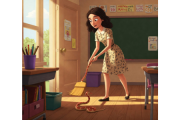Just before arriving at our destination, we had to cross a small river, and as was typical of that time this meant crossing a very narrow bridge, built down at the level of the stream, many feet below the level of the access road on either side. Drivers thus drove down a steep slope to cross the bridge, one car at a time, before climbing an equally steep slope on the other side. It was hard to imagine, as we soon learned, that, in the rainy season, the river would rise to such heights that the bridge and road on both sides would be completely covered, feet deep, in muddy water. Drivers would find themselves stranded, sometimes for days, unable to cross the bridge. One had to be prepared for such an eventuality. There was nothing to do but wait until the waters receded somewhat.
When we arrived in late May, though, this river was a mere stream. The rainy season wasn’t due to start for months to come, in November. We simply crossed the bridge, and drove into the village, where the small railway station was on the left-hand side, and the one tiny general store and the petrol station, with its two pumps, further up on the right-hand side. A tree-covered hill, called by the local whites, in Afrikaans, a “kopje”, had a wide firebreak, bare of vegetation, running down it. This hill stood in the near foreground, with a few houses visible along its base, and amongst the trees.
My father stopped at the railway station to say hello to his new colleagues, before turning off the strip road, along a dirt track for a mile or so, to reach the three bungalows standing alone, in the long grass, away from the rest of the village. The middle house was to be ours for the foreseeable future.
We drove through an open gateway, and up to the house, parked the car, and disembarked. My father tried the front veranda door, only to find that it was locked and that he didn’t have the key, meaning he would have to go back to the station to fetch it. He left my mother, with us three children to wander round the large garden, which didn’t have all that much in it, except for red soil. We were surrounded by very tall bush grass, and nothing much else.
I must give my mother, at thirty-one years of age, and with three young children, credit for staying calm in the face of what she thought, at the time, was imminent danger, in the shape of a lion which she had noticed creeping stealthily through the long grass behind our back yard. With all of us at risk of being eaten alive, and with my father gone to fetch the key, she obviously thought quickly of where we could best be safe. She had to get all of us inside the house, somehow, and mighty quickly. She had seen, as we’d walked round, a small fanlight window open at the back, in what turned out to be the bathroom, so, without explaining why, she told my brother, John, that she would lift him up, so that he could squeeze through that window, open a big window, and let us all in.
The plan worked perfectly. John did as he was told, getting us all into the house, within minutes. I can’t imagine the fear and the panic my mother must have experienced at that time, as a new immigrant to the wilds of Africa, alone with her children. My father, in years to come, used to joke that his wife had managed to save the family, yes, but hadn’t worried at all about his safety, although she knew he would be returning to the house, to be faced by the same lion. To be fair, he was in a car, and she couldn’t have warned him, in any case since cell phones didn’t exist in those days.
So, we were all inside, much to my father’s surprise, when he came back with the key. It was only later that we all learned that the lion was, in fact, nothing but the large, tan-coloured Rhodesian ridgeback dog belonging to the stationmaster’s family next door!
So began our life in the bush. We didn’t know what lay ahead of us, of course, but we were relieved not to have been eaten by a lion within an hour of arrival.





